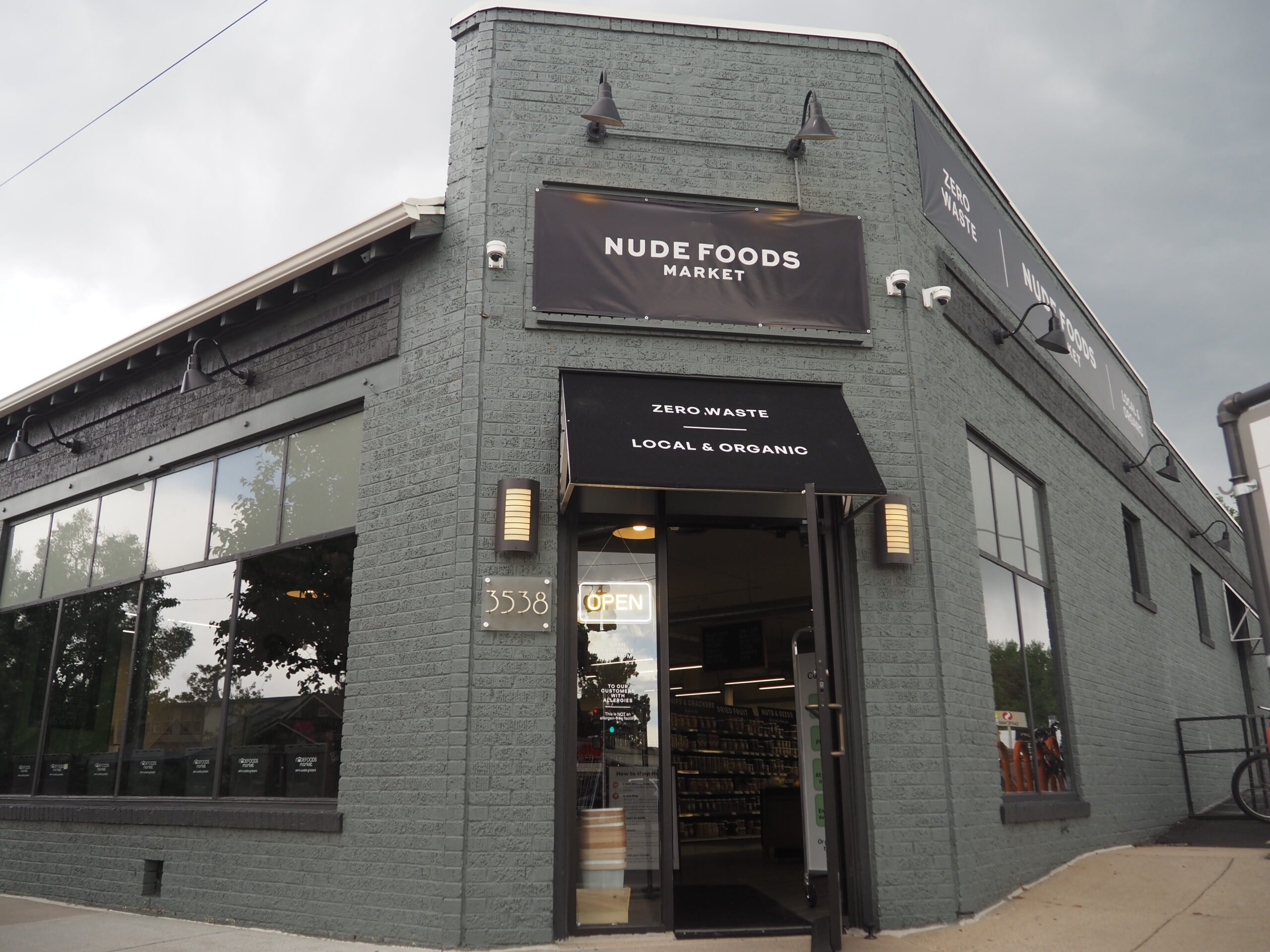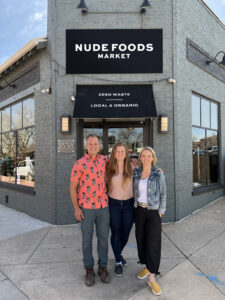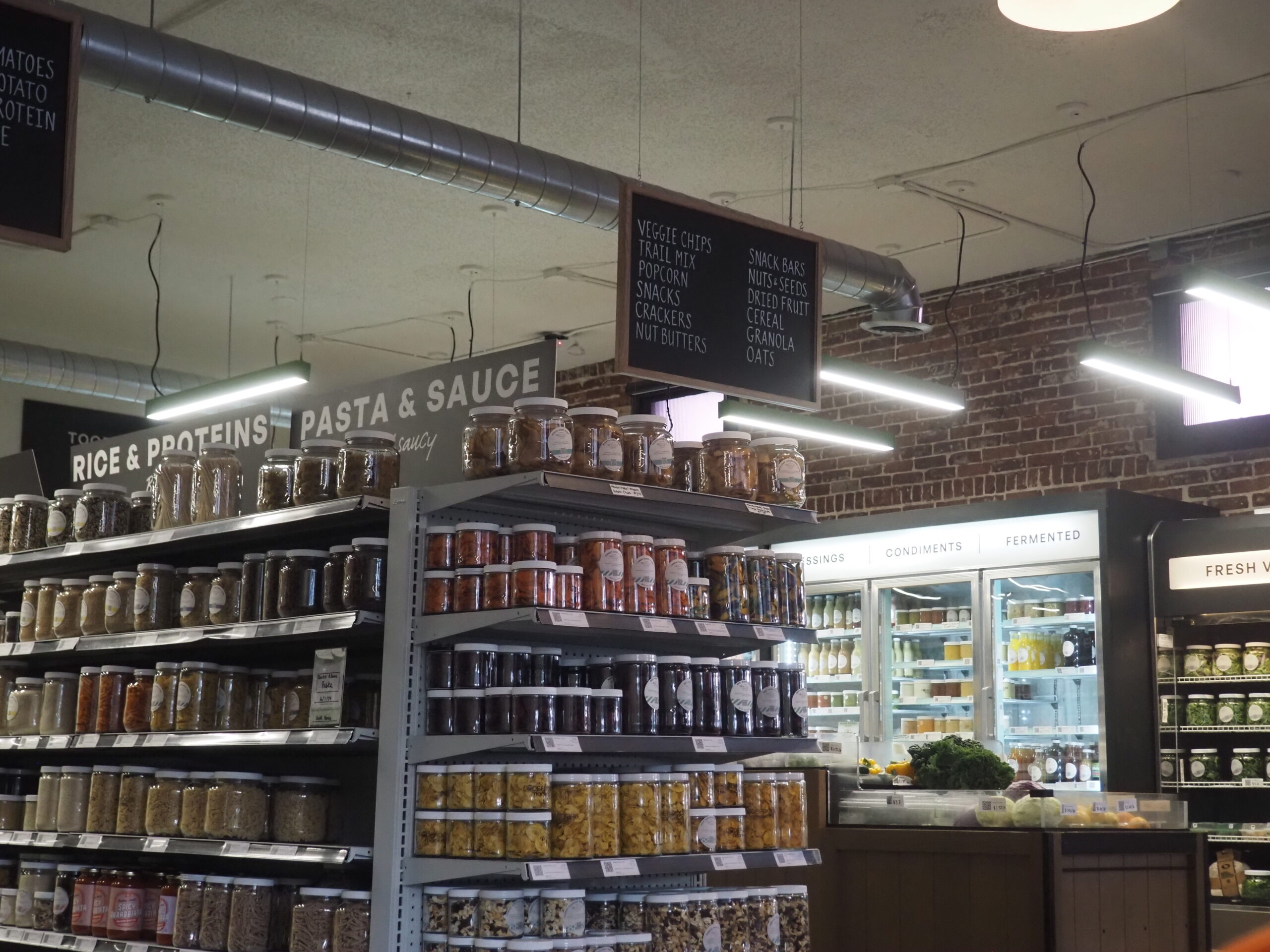
Nude Foods started in Boulder before adding a second location in Denver’s Berkeley neighborhood. (Matt Geiger/BusinessDen)
On Oct. 18, a small Boulder grocery store said in a press release that it would open its second location in Denver before Halloween.
Halloween came and went. So did Thanksgiving, Christmas and Easter. In mid-April, Nude Foods finally opened at 3538 W. 44th Ave. in Berkeley.
The hangup? Denver’s arcane permitting process.
“There isn’t one person you can go to who knows everything and can link it all together. I think that’s really the root of the problem,” said Rachel Irons, Nude Foods co-founder.
Irons said the business lost about $40,000 paying rent before opening. And that doesn’t include the roughly $10,000 that the company paid architects, contractors and engineers, even though no construction took place. The store also opened in the spring, which tends to be a more difficult time for the grocery business than the fall, as customers begin their summer traveling and take their dollars with them, Irons said.
“This puts us in a very precarious position,” she said. “Now, we have a lot less runway opening the store. We have to get to profitability really quickly.”
Nude Foods, which emphasizes zero-waste practices and locally sourced goods, leased half of a small building across from a Safeway. The 2,200-square-foot space was formerly home to a tattoo parlor.
Irons said she chose the location in part because the space didn’t need much work. Nude Foods just needed to install some shelves and coolers.
But it wasn’t that simple. Irons said she applied for a zoning permit, believing that was all that would be needed. But when she went to weekly building department “office hours,” where individuals can meet with inspectors and reviewers, she said she was told she also needed a change in occupancy permit.
“It’s confusing that zoning and change of occupancy are two different things, because it seems like the same thing,” Irons said.
The second permit meant many of the building’s systems, from HVAC to the parking lot, had to be inspected, Irons said. The company hired a contractor, architect and engineers.
“All of these systems that we didn’t touch, we had to pay for engineers,” she said.
Some changes the company did have to make were small in nature, such as re-striping the parking lot.
“What’s also very confusing is the order that you have to do things in,” Irons said. “We had to wait until our zoning permit was approved to get the parking lot re-striped. But then you have to get it striped before it can get inspected and then it’s really confusing which approvals you have to wait for before you can take the next step.”
Minor mistakes were costly, Irons said, because getting something wrong on one inspection means that, after addressing the issue, the business had to wait until it could get another inspection. All the while, Nude Foods was paying rent.

From left to right: Nude Food founders Matt Arnold, Rachel Irons and Verity Noble in front of the Denver store. (Courtesy Nude Foods)
Denver’s Community Planning and Development department holds its office hours twice a week. Irons said she went regularly and, while staff were helpful when discussing their own specialty, she still didn’t walk away understanding the process.
“There’s literally no one that can tell you the whole process. Nobody — like, nobody — knows everything,” she said.
Irons said the staffers she interacted with at the city were helpful, but she also acknowledged the bureaucracy.
She said that one inspector she worked with, a former chef, told her that if he opened a restaurant, it would be “right outside the line for Denver.” At the end of the process, a reviewer told her they weren’t even sure Nude Foods had needed a change-of-occupancy permit.
Irons suggested the city hire “permitting consultants” who can advise businesses through the process. She said that it was unfair that her small business — not the previous tenant or property owner — was on the hook for bringing the building up to code.
“Maybe there can be grant money from the city for that, because why does it have to go on this one small business that just was in the wrong place at the wrong time?” Irons said.

Inside Nude Foods, which opened last month in Denver’s Berkeley neighborhood. (Matt Geiger/BusinessDen)
In a statement to BusinessDen, Ryan Huff, a spokesman for Community Planning and Development, said that, “We acknowledge that permit reviews can take longer than customers would like.
“On occasion, that is due to CPD’s volume and various factors, while other times it is due to time taken by customers to resubmit applications so they meet city code,” Huff said. “In this case, we issued a Zoning Permit on Dec. 9, 2023, and stated that additional reviews may be required. The customer waited until Feb. 16, 2024, to apply for the necessary Change of Occupancy Permit – thus contributing to a two-month delay.”
Irons said the delay was due to hiring firms to perform the needed inspections.
“If we had known we had needed that earlier, we would have started that process earlier. It was just unclear what we needed to do,” she said.
Now that Nude Foods is open, Irons is on the hunt for a third location — and keeping the permitting process top of mind.
“For store number three, it’ll alter what type of building we get,” Irons said. “One of the reasons we chose this space is because we knew we could get away without doing any construction. So, that was great. But now we’ll want a place so we don’t have to do any construction, and we don’t have to do any change of use. So, that really limits our options.”

Nude Foods started in Boulder before adding a second location in Denver’s Berkeley neighborhood. (Matt Geiger/BusinessDen)
On Oct. 18, a small Boulder grocery store said in a press release that it would open its second location in Denver before Halloween.
Halloween came and went. So did Thanksgiving, Christmas and Easter. In mid-April, Nude Foods finally opened at 3538 W. 44th Ave. in Berkeley.
The hangup? Denver’s arcane permitting process.
“There isn’t one person you can go to who knows everything and can link it all together. I think that’s really the root of the problem,” said Rachel Irons, Nude Foods co-founder.
Irons said the business lost about $40,000 paying rent before opening. And that doesn’t include the roughly $10,000 that the company paid architects, contractors and engineers, even though no construction took place. The store also opened in the spring, which tends to be a more difficult time for the grocery business than the fall, as customers begin their summer traveling and take their dollars with them, Irons said.
“This puts us in a very precarious position,” she said. “Now, we have a lot less runway opening the store. We have to get to profitability really quickly.”
Nude Foods, which emphasizes zero-waste practices and locally sourced goods, leased half of a small building across from a Safeway. The 2,200-square-foot space was formerly home to a tattoo parlor.
Irons said she chose the location in part because the space didn’t need much work. Nude Foods just needed to install some shelves and coolers.
But it wasn’t that simple. Irons said she applied for a zoning permit, believing that was all that would be needed. But when she went to weekly building department “office hours,” where individuals can meet with inspectors and reviewers, she said she was told she also needed a change in occupancy permit.
“It’s confusing that zoning and change of occupancy are two different things, because it seems like the same thing,” Irons said.
The second permit meant many of the building’s systems, from HVAC to the parking lot, had to be inspected, Irons said. The company hired a contractor, architect and engineers.
“All of these systems that we didn’t touch, we had to pay for engineers,” she said.
Some changes the company did have to make were small in nature, such as re-striping the parking lot.
“What’s also very confusing is the order that you have to do things in,” Irons said. “We had to wait until our zoning permit was approved to get the parking lot re-striped. But then you have to get it striped before it can get inspected and then it’s really confusing which approvals you have to wait for before you can take the next step.”
Minor mistakes were costly, Irons said, because getting something wrong on one inspection means that, after addressing the issue, the business had to wait until it could get another inspection. All the while, Nude Foods was paying rent.

From left to right: Nude Food founders Matt Arnold, Rachel Irons and Verity Noble in front of the Denver store. (Courtesy Nude Foods)
Denver’s Community Planning and Development department holds its office hours twice a week. Irons said she went regularly and, while staff were helpful when discussing their own specialty, she still didn’t walk away understanding the process.
“There’s literally no one that can tell you the whole process. Nobody — like, nobody — knows everything,” she said.
Irons said the staffers she interacted with at the city were helpful, but she also acknowledged the bureaucracy.
She said that one inspector she worked with, a former chef, told her that if he opened a restaurant, it would be “right outside the line for Denver.” At the end of the process, a reviewer told her they weren’t even sure Nude Foods had needed a change-of-occupancy permit.
Irons suggested the city hire “permitting consultants” who can advise businesses through the process. She said that it was unfair that her small business — not the previous tenant or property owner — was on the hook for bringing the building up to code.
“Maybe there can be grant money from the city for that, because why does it have to go on this one small business that just was in the wrong place at the wrong time?” Irons said.

Inside Nude Foods, which opened last month in Denver’s Berkeley neighborhood. (Matt Geiger/BusinessDen)
In a statement to BusinessDen, Ryan Huff, a spokesman for Community Planning and Development, said that, “We acknowledge that permit reviews can take longer than customers would like.
“On occasion, that is due to CPD’s volume and various factors, while other times it is due to time taken by customers to resubmit applications so they meet city code,” Huff said. “In this case, we issued a Zoning Permit on Dec. 9, 2023, and stated that additional reviews may be required. The customer waited until Feb. 16, 2024, to apply for the necessary Change of Occupancy Permit – thus contributing to a two-month delay.”
Irons said the delay was due to hiring firms to perform the needed inspections.
“If we had known we had needed that earlier, we would have started that process earlier. It was just unclear what we needed to do,” she said.
Now that Nude Foods is open, Irons is on the hunt for a third location — and keeping the permitting process top of mind.
“For store number three, it’ll alter what type of building we get,” Irons said. “One of the reasons we chose this space is because we knew we could get away without doing any construction. So, that was great. But now we’ll want a place so we don’t have to do any construction, and we don’t have to do any change of use. So, that really limits our options.”
